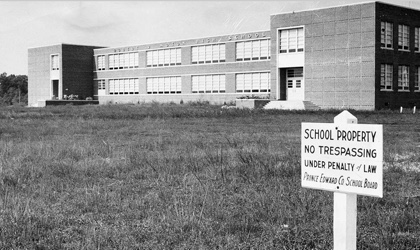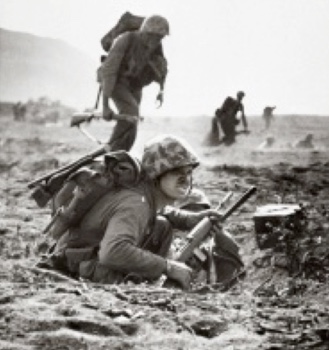NYT History Book Reviews: Who Got Noticed this Week?

Book: Something Must Be Done About Prince Edward County: A Family, a Virginia Town, a Civil Rights Battle
Publisher's Summary (via Amazon): "In the wake of the Supreme Court’s unanimous Brown v. Board of Education decision, Virginia’s Prince Edward County refused to obey the law. Rather than desegregate, the county closed its public schools, locking and chaining the doors. The community’s white leaders quickly established a private academy, commandeering supplies from the shuttered public schools to use in their all-white classrooms. Meanwhile, black parents had few options: keep their kids at home, move across county lines, or send them to live with relatives in other states. For five years, the schools remained closed.
"Kristen Green, a longtime newspaper reporter, grew up in Farmville and attended Prince Edward Academy, which did not admit black students until 1986. In her journey to uncover what happened in her hometown before she was born, Green tells the stories of families divided by the school closures and of 1,700 black children denied an education. As she peels back the layers of this haunting period in our nation’s past, her own family’s role—no less complex and painful—comes to light."
"During my childhood,” Green writes, “my family rarely discussed what had happened, and only in broad strokes.”
Author: Kristen Green
Reviewer: Jonathan Martin
Review highlights:
"...an affecting history of one community’s struggles with race."
"Yet it is not just these vignettes showing the ways segregation was peacefully fought, defended and perpetuated that make Ms. Green’s book so valuable. It is also the difficult questions she asks about Prince Edward County and Farmville, its seat and largest town, today. This is not just a work of history but also a story of how resistance to integration still shapes American life."
Comments: Prince Edwards, you say? Down with the British! Oddly enough, another book about this same subject was published back in March of this year, a title by the name of Locked Out!: A Story About the Prince Edward County Public School Closings by Jamantha Wilson.

Book: Men of War: The American Soldier in Combat at Bunker Hill, Gettysburg, and Iwo Jima
Publisher's Summary (via Amazon): "Drawing on firsthand sources from the battlefield, the book begins by re-creating the lost and alien world of eighteenth-century warfare at Bunker Hill, the bloodiest clash of the War of Independence—and reveals why the American militiamen were so lethally effective against the oncoming waves of British troops. Then, focusing on Gettysburg, it describes a typical Civil War infantry action, vividly explaining what Union and Confederate soldiers experienced before, during, and after combat. Finally, it shows how in 1945 the Marine Corps hurled itself with the greatest possible violence at the island of Iwo Jima, where nearly a third of all Marines killed in World War II would die. As the author demonstrates, the most important factor in any battle is the human one: At Bunker Hill, Gettysburg, and Iwo Jima, the American soldier, as much as any general, proved decisive."
Author: Alexander Rose, a historian who wrote for HNN back in 2008.
Reviewer: Andrew J. Bacevich, who is writing a history of United States military involvement in the greater Middle East. He is currently Columbia University’s George McGovern Fellow, and his most recent book is, Breach of Trust: How Americans Failed Their Soldiers and Their Country.
Review highlights:
"As an exercise in antiquarianism, the result rates as a considerable success."
"For buffs, “Men of War” is a treasure trove."
"In some respects, Rose has done himself a disservice in his choice of battles. Whether or not they qualify as iconic, Bunker Hill, Gettysburg and Iwo Jima do not invite useful comparison."
"Designing a book is the author’s prerogative, of course. Yet it’s a reviewer’s prerogative to speculate on what a different approach might have produced. Imagine if instead of Bunker Hill — does anyone outside Boston really care what happened there? — Rose had added Hamburger Hill or the second battle of Fallujah to the mix. Yes, the result would have been a decidedly different book. But it just might have been a more illuminating one as well."
Comments: If Rose used The Battle for Middle-earth as another example, the book would've been much more crowd pleasing. Long live Bilbo!

Book: Putinism: Russia and Its Future With the West
Summary: "Looking to the future, Laqueur explains how America's tendency to see Russia as a Cold War relic is dangerous and premature. Russia can and will challenge the West and it is in our best interest to figure out exactly who we are facing-and what they want-before it is too late." via Amazon.
“What is Putinism?” Mr. Laqueur asks. “A great amount of mental energy has been devoted to finding an accurate definition, as so often happens when a new regime appears. But it has not been a very successful enterprise.”
Author: Walter Laqueur, an American historian and political commentator. He just recently appeared on HNN with an analysis of the leftwing writers who make apologies for Putin.
Reviewer: Peter Baker
Review highlights:
"Into this examination comes Mr. Laqueur, with trademark scholarly discipline deconstructing Mr. Putin, who in his 16 years as prime minister and president has defied the understanding of some of the world’s best-informed leaders and best-financed intelligence agencies."
"Mr. Laqueur, who has studied Russia for more than 60 years and has written more than 25 books, does not fall for the easy traps. While some in the United States see Mr. Putin as simply a revanchist Soviet, even a latter-day Stalin, Mr. Laqueur understands it is not so simple."
Comments: Putin holds the title of Master of Sports in judo, a multiple champion of St Petersburg in Sambo and Master of Sports in Sambo. He also holds a black belt in karate. “Judo teaches self-control, the ability to feel the moment, to see the opponent’s strengths and weaknesses, to strive for the best results. I am sure you will agree that these are essential abilities and skills for any politician," said Putin.

Book: Big Science: Ernest Lawrence and the Invention That Launched the Military-Industrial Complex
Publisher's Summary (via Amazon): "The untold story of how science went 'big,' built the bombs that helped win World War II, and became dependent on government and industry—and the forgotten genius who started it all, Ernest Lawrence.
"The birth of Big Science can be traced to Berkeley, California, nearly nine decades ago, when a resourceful young scientist with a talent for physics and an even greater talent for promotion pondered his new invention and declared, 'I’m going to be famous!' Ernest Orlando Lawrence’s cyclotron would revolutionize nuclear physics, but that was only the beginning of its impact. It would change our understanding of the basic building blocks of nature. It would help win World War II. Its influence would be felt in academia and international politics. It was the beginning of Big Science."
Author: Michael Hiltzik, an American columnist and reporter who has written extensively for the Los Angeles Times.
Reviewer: Robert P. Crease is a professor of philosophy at Stony Brook University, a a co-editor in chief of Physics in Perspective and the co-author of The Quantum Moment: How Planck, Bohr, Einstein and Heisenberg Taught Us to Love Uncertainty.
Review highlights:
"In his lucidly written “Big Science: Ernest Lawrence and the Invention That Launched the Military-Industrial Complex,” the Pulitzer Prize-winning journalist Michael Hiltzik provides a solid account of the early days of the trend toward such gargantuan projects."
"Hiltzik’s tale is important for understanding how science and politics entwine in the United States, and he moves it along efficiently, with striking details and revealing quotations."
Comments: The Avengers 4: The Invention of Cyclotron is coming to a theater near you. 3D goggles not included.

Summary: "Sir Thomas Browne (1605–1682) was an English writer, physician, and philosopher whose work has inspired everyone from Ralph Waldo Emerson to Jorge Luis Borges, Virginia Woolf to Stephen Jay Gould. In an intellectual adventure like Sarah Bakewell's book about Montaigne, How to Live, Hugh Aldersey-Williams sets off not just to tell the story of Browne's life but to champion his skeptical nature and inquiring mind.
We meet Browne the master prose stylist, responsible for introducing hundreds of words into English, including electricity, hallucination, and suicide. Aldersey-Williams reveals how Browne’s preoccupations―how to disabuse the credulous of their foolish beliefs, what to make of order in nature, how to unite science and religion―are relevant today." via Amazon.
Author: Hugh Aldersey-Williams http://www.hughalderseywilliams.com/bio
Reviewer: Jim Holt, an author and philosopher.
Review highlights:
"The book does not merely seek to revive Browne as a pivotal figure in the history of English prose: a minor writer with a major style. Its author also wants to convince us that Browne, with his intellectual curiosity, his good-humored skepticism, his civility and spirit of tolerance, stands as a model for us today."
"Furnished with such unpromising biographical materials, Aldersey-Williams ends up working the “In Search of” angle pretty hard, to give the book extra narrative shape."
"Aldersey-Williams proves to be a sure guide, piecing together a delightful portrait of a man who “stands at the gates of modern science and yet remains happily in thrall to the ancient world and its mysteries.”
Comments: The statue of Sir Thomas Browne in Norwich City Centre looks a bit like V from V for Vendetta. Perhaps the Wachowski Brothers are Browne enthusiasts.